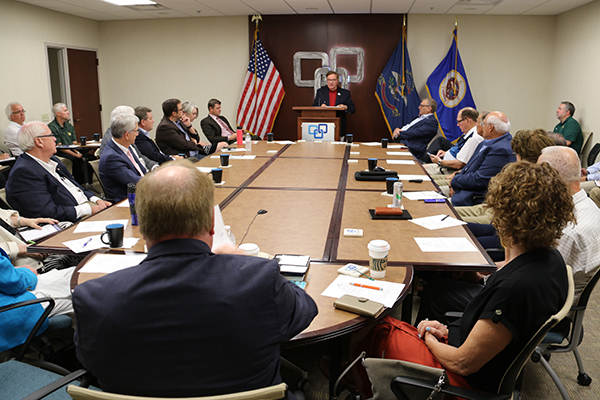-
Minnesota Legislative Update - February 25, 2022
-
Minnesota Legislative Update - February 25, 2022
Katherine GrindbergFriday, February 25, 2022
Unemployment Insurance Trust Fund
Last week, the Minnesota Senate debated and passed Senate File 2677. This legislation, authored by Senator Eric Pratt (R-Prior Lake), appropriates $2.73 billion from the general fund to the Department of Employment and Economic Development for repayment of outstanding loans and interest from the federal unemployment insurance trust fund and replenishment of the Unemployment Insurance Trust Fund (UITF). The state’s Unemployment Insurance Trust Fund (UITF) currently owes $1.1 billion in debt with a 2.27% rate of interest to the federal government. The state began borrowing from the federal government, like many states, to pay for a rise in unemployment claims due to state-ordered closures of businesses in response to the pandemic. The UITF needs to restore a balance of $1.6 billion to meet the requirements of the federal government. The fund needs, to be solvent, about $2.7 billion, otherwise state employers could see unemployment insurance tax rates grow by double digits.
Frontline Worker Pay
On Monday, the House Ways and Means Committee, chaired by Representative Rena Moran (DFL-St. Paul), heard House File 2900. This legislation, authored by Representative Cedrick Frazier (DFL-New Hope), establishes a program for making payments of up to $1,500 to frontline workers whose work put them at risk of contracting COVID-19 during the peacetime emergency declared by the governor.
Following the news in early December that the state has a $7.7 billion budget surplus, DFL members of the group proposed quadrupling the allocation for frontline workers from $250 million to $1 billion to allow for $1,500 bonus checks for the 667,000 frontline workers identified in their initial proposal. This is the last finance committee in the House where this legislation needs approval before heading to the House floor.
Nurse Licensure Compact
On Monday, the Senate Health and Human Services Committee, chaired by Senator Paul Utke (R-Park Rapids), is scheduled to hear Senate File 2302. This legislation, authored by Senator Carla Nelson (R-Rochester), is known as the Nurse Licensure Compact.
The Nurse Licensure Compact allows for registered nurses and licensed practical/vocational nurses to have one multistate license, with the privilege to practice in their home state and other Nurse Licensure Compact states without obtaining additional licenses.
Currently, 39 member states have enacted the Nurse Licensure Compact. Licensure requirements are aligned in nurse licensure compact states, so all nurses applying for a multistate license are required to meet those same standards. All states that participate in the Nurse Licensure Compact conduct federal criminal background checks to determine eligibility for a multistate license.
With the multistate license, nurses are able to provide telehealth nursing services to patients located in nurse licensure compact states. A multistate license facilitates cross-border practice for many types of nurses who routinely practice with patients in other states – including primary care nurses, case managers, transport nurses, school and hospice nurses, and many others. Advocates of the compact argue that it will help attract qualified, skilled nurses to Minnesota to fill current vacancies in clinics and hospitals across the state.
Drought Relief
On Tuesday, the House Environment and Natural Resources Finance and Policy Committee, chaired by Representative Rick Hansen (DFL-South St. Paul), heard House File 3598. This legislation, authored by Hansen, is a response to the severe drought conditions during the 2021 growing season impacting Minnesota farmers and livestock producers.
In September, Governor Walz proposed a $10 million drought relief package that includes $5 million in rapid response grants to provide drought relief for livestock producers and specialty crop producers and $5 million for the Rural Finance Authority’s Disaster Recovery Loan Program. The Rural Finance Authority’s Disaster Recovery Loan Program makes zero-interest loans available immediately for Minnesota farmers whose operations are suffering from lack of rain. The loan can be used to help cover lost revenue or expenses not covered by insurance.Tell a Friend
-
A catalyst for growth and prosperity.

